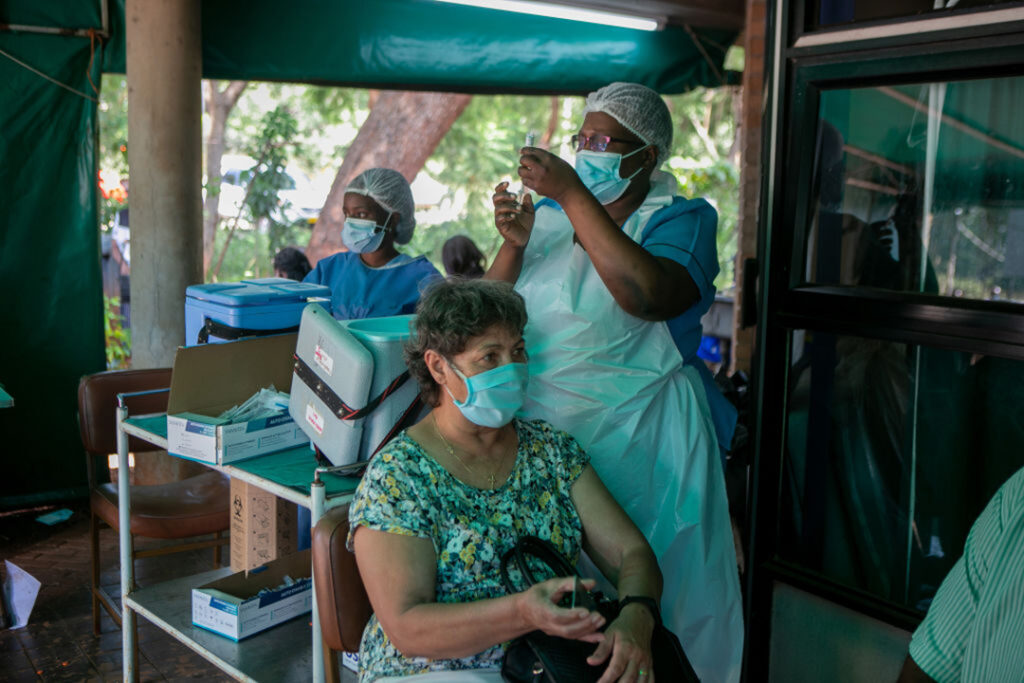ADF STAFF
Felda Mupemhi grabbed her walking stick and slowly made her way toward a white tent outside Wilkins Hospital in Harare, Zimbabwe, where she received a COVID-19 vaccine.
Once fearful of receiving the jab, the 85-year-old was one of more than 123,000 Zimbabweans who had got a dose by early April. The government plans to inoculate 60% of its population — about 10 million people — to achieve herd immunity and had received roughly 2 million vaccine doses.
But there is skepticism among many younger Zimbabweans over the safety and efficacy of the vaccines. When Mupemhi received her shot, more than 500,000 vaccines still were unused, Deutsche Welle (DW) reported.
She was among a growing number of older Zimbabweans who want to dispel fears.
“We stand a chance of beating COVID-19 if we take this vaccine,” Mupemhi told the United Kingdom’s The Guardian. “So, I came here to make a statement to the younger [generation] that they too can get vaccinated, so that we save others.”
Peter Hadingham, 82, was happy to receive his first shot after previously being denied a vaccine due to his age, asthma and back problems.
“I have a flu vaccine every year, there is no difference,” Hadingham told The Guardian. People “should think of the rest of the population. They should get vaccinated, because there is nothing to be afraid of.”
Dr. Prosper Chonzi, director of Harare’s Health Services, was encouraged by the growing numbers of elderly residents getting vaccinated, including those with chronic health issues.
“Our older population appreciates that they are vulnerable,” Chonzi told The Guardian. “Once you get the infection, chances of severity are high, so they are jumping at the opportunity. If you are given the offer of getting the vaccine, and it is free, it is wise to take it.”
Despite the growing number of elderly residents getting vaccinated, many Zimbabweans remain skeptical and plan to rely on unproven herbal remedies to prevent the spread of COVID-19, Quartz Africa reported in March.
Itai Rusike, executive director of Zimbabwe’s Community Working Group on Health, a network of community-based organizations, said it’s common for many Zimbabweans, especially those in rural areas, to consult traditional healers before seeking modern medical care.
“This has been exacerbated by the COVID-19 pandemic, as the majority of people in Zimbabwe seem to have more faith and trust in home remedies to prevent and treat COVID-19-related illnesses due to vaccine disinformation and skepticism,” Rusike told Quartz Africa.
That skepticism likely was fueled by Zimbabwe’s own government, which touted herbal treatments against the virus in the early months of the pandemic — as did Tanzania and Madagascar. Physicians criticized Zimbabwe’s approach, which some health experts believe may hamper vaccination efforts.
More recently, Zimbabwe’s government has touted the importance of vaccines. Although its vaccination campaign is voluntary, President Emmerson Mnangagwa has suggested that people eventually will lose their jobs and suffer other consequences if they do not receive the shot.
“If you are not vaccinated, you will not use government public buses, so it is up to you to decide what you will do,” Mnangagwa said in the DW report.

